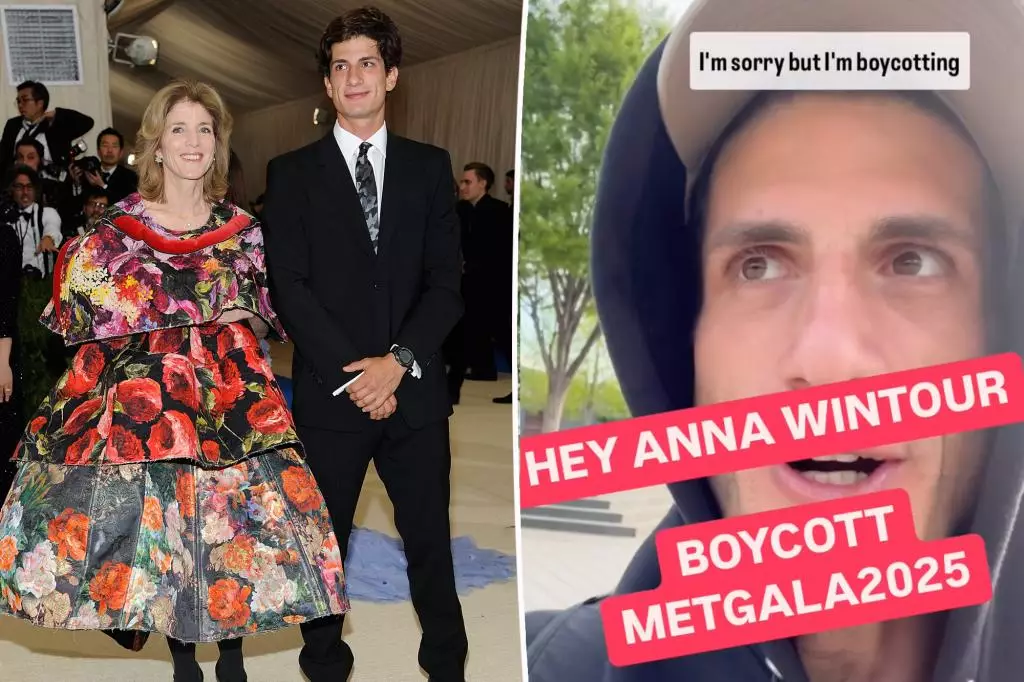In the world of celebrity culture, few events garner as much anticipation and intrigue as the Met Gala. This highly exclusive red-carpet affair, often referred to as the “Oscars of fashion,” draws the who’s who of society and the arts. However, this year, one figure has taken to social media to express fervent disapproval: Jack Schlossberg, the grandson of JFK and son of Caroline Kennedy. His self-declared boycott of the upcoming event is not merely a personal vendetta; it serves as a reflection of his broader concerns regarding social issues and the perceived disconnect between fashion, politics, and contemporary issues.
Schlossberg’s social media rants have raised eyebrows, particularly given that he was not formally invited to this year’s gala. Insiders assert that his absence from the guest list has little to do with a boycott and more to do with the exclusive nature of the event, where invitations are typically extended through designer representation or brand sponsorships. Schlossberg attended the event in 2017 as a plus-one, but he seems to be creating a narrative that frames his absence as a personal moral stance rather than a result of logistical limitations.
The Art of the Boycott
In an age where social media can amplify voices and rally support for causes, Schlossberg’s approach can be seen as both audacious and ineffective. He broadcasts multiple posts about his boycott, exemplifying a calculated attempt to redirect attention towards pressing global issues. “With so much happening at home and around the world, it’s not the time for a party like that — at least for me,” he declared. This statement, however, introduces a paradox: while he positions himself as an advocate for social issues, his engagement with the gilded Met Gala—a fashion event synonymous with extravagance—calls into question the authenticity of his claims.
Moreover, Schlossberg’s assertions are not just a personal reflection; they encapsulate an ongoing struggle within the fashion industry, where the intersection of corporate interests and individual expression remains contentious. Critics of the fashion industry argue that it often prioritizes profit over purpose, leading to a disconnection from the very societal issues it claims to represent. By highlighting the silence of a powerhouse like Vogue, Schlossberg attempts to challenge the status quo, urging the magazine to utilize its immense platform for advocacy rather than following the whims of commercial interests.
Connecting Through Controversy
Of course, controversy is not new in the realm of celebrity. There’s a smartness to Schlossberg’s decision to leverage his perceived slight as a platform to promote an upcoming project on his own news channel. It’s a calculated maneuver that signals an understanding of social media’s power dynamics. “Instead I will produce something informative on my own news channel,” he states, transforming a perceived rejection into an opportunity to further his own brand.
Yet, therein lies another layer of complexity. Schlossberg’s social media tirade teeters between a genuine call for awareness and a self-serving publicity stunt. His ambition to establish a unique footing in the saturated media landscape might have been muddied by the self-portrayal of a social activist. The nature of his boycott aligns closely with an emerging trend where personal brands must constantly recalibrate their messages to gain traction.
A New Era in Fashion Activism?
It’s worth noting that the Met Gala this year embraces the theme “Superfine: Tailoring Black Style,” an intriguing choice that speaks volumes about cultural milestones in fashion. As luminaries like A$AP Rocky and Lizzo take center stage, Schlossberg’s critique rings semi-relevant. He urges individuals and institutions within the industry to adopt a more socially responsible lens, challenging them to align fashion with activism. Yet, how effective this dialogue will be in shifting entrenched norms remains to be seen.
Ultimately, Schlossberg’s heartfelt cries echo across a landscape where fashion, culture, and activism collide. Whether he’s appropriately voicing the concerns of a generation or merely crafting a narrative for personal gain, the lines blur as social media continues to redefine influence and accountability. His self-branded boycott may not spell doom for the Met Gala, but it certainly incites conversations that transcend the allure of glamour—delving into the very heart of what it means to wield influence in today’s world.

